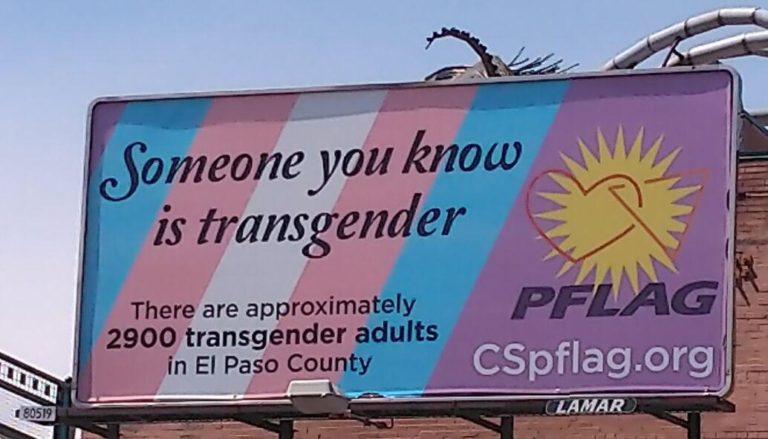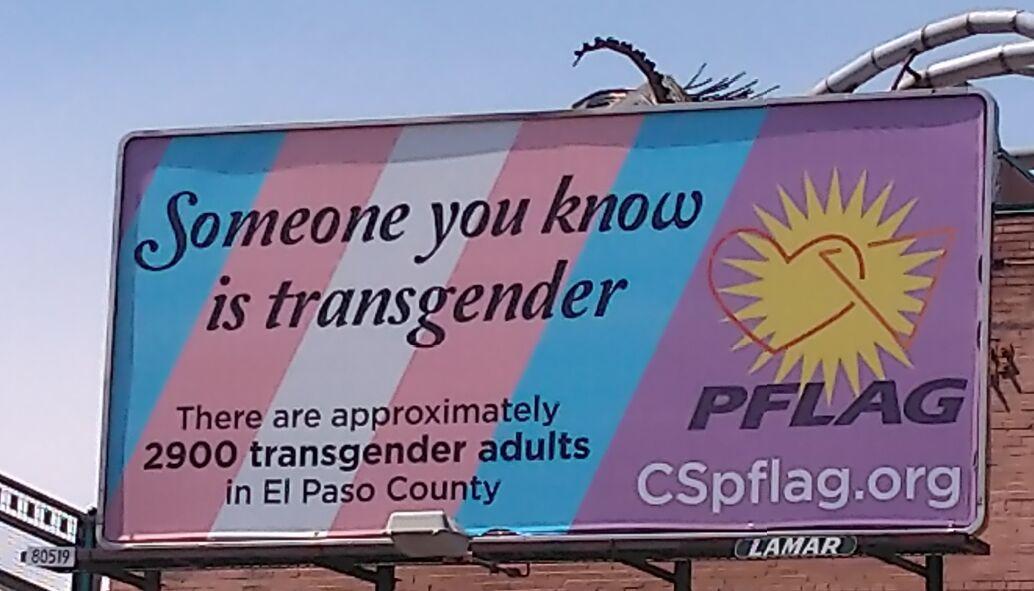

Chances are, you’ve met someone, know someone or have heard of someone who’s transgender.
About 2,900 transgender adults live in El Paso County, according to an analysis by the local chapter of Parents, Families and Friends of Lesbians and Gays, better known as PFLAG.
For a few more days, a simplistic yet impactful billboard on the West Colorado Avenue bridge will display the statistic, to help normalize and familiarize residents with the transgender community.
“Our hope is that it will promote conversations as people drive by,” said Karen Stith, president of the local PFLAG group, which has about 70 members and more than 400 supporters.
A local family and their transgender child designed the billboard, which says, “Someone you know is transgender,” and presents the county statistic.
The awareness-raiser is a first for PFLAG.
“We try to be visible, but we’ve never done anything this big and flashy before,” Stith said. “We accumulated enough money to have a billboard and thought it was a really good use of our funds to get the word out about transgender people.”
PFLAG began on a national level as a nonprofit support organization in 1983, and the local chapter was founded in 1994.
Estimates on the numbers of transgender people vary. A 2016 report from the Williams Institute concluded that up to 0.8% of American adults identify as transgender.
Danette Tritch, coordinator of the TransParent group at Inside Out Youth Services in Colorado Springs and the mother of an adult child who is transgender, said more current statistics report up to 2% of the adult population identifies as transgender.
A number she said is perhaps more meaningful is that one in six children in a typical classroom would benefit from “representation in books and materials of the LGBTQ community,” suggesting a parent or other relative or the child identifies with the entire LGBTQ community.
A transgender person is someone whose sense of personal identity and gender does not correspond with their birth sex.
Many transgender people receive hormone therapy to alter their physical characteristics, some have surgery and most dress in the clothing that complies with their personal identity.
Although civil and personal rights for LGBTQ people have improved in recent years, the trans community struggles with acceptance, discrimination and harassment, both Stith and Tritch said.
“The emotional stress on trans people is extraordinary,” said Stith, who has an adult lesbian daughter. “Gays and lesbians have become so common and part of our society, but the trans people are where gay people were 40 years ago — they’re being rejected out of hand.”
Under the leadership of a gay governor, Colorado’s lawmakers have advanced LGBTQ causes, but many states are going in the opposite direction, Tritch said.
Legislators in conservative states, including Texas Montana, Arkansas and Florida, are banning trans participation in sports, use of bathrooms and locker rooms and “trans-affirming” medical treatments for youth under age 18, she said.
More than 80 restrictive state bills are in various stages of becoming laws, Tritch said.
That means “2021 will be on record as the historically worst year for bad LGBTQ bills, most of which are trans-related,” she said.
On the Congressional stage, the Equality Act, which the House of Representatives passed in February but has not been up for a vote in the U.S. Senate, would create a protected class in all states, including the 27 that, according to the Human Rights Campaign, do not have LGBTQ anti-discrimination laws.
The bill would amend the 1964 Civil Rights Act to ban discrimination based on sexual orientation and gender identity, and substantially expand protected areas to cover not only housing, employment and healthcare but also “public accommodations.”
That would include retail stores, transportation systems and stadiums, for example, and federally funded programs.
Opponents cite infringement on religious rights as a concern.
PFLAG members hope that the billboard will provoke reflection and the realization that “transgender people deserve the same rights as other people and that instead of being discriminated against should be valued and celebrated by all of us,” Stith said.
The billboard will be up through May 11.